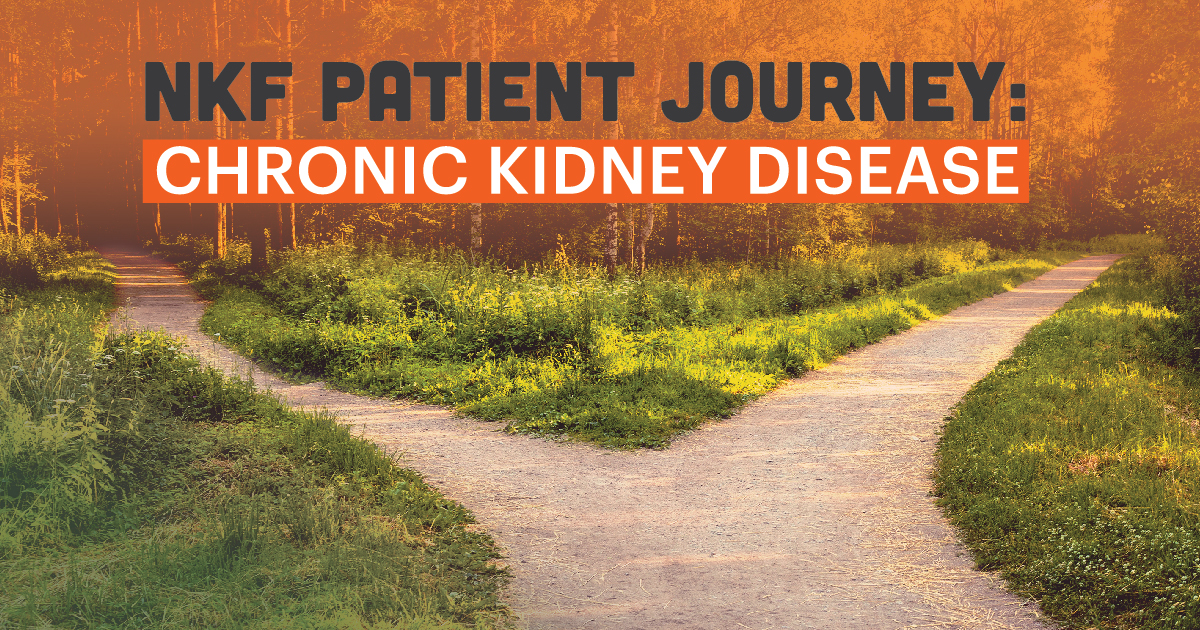Last Updated: July 06, 2023
Medically reviewed by NKF Patient Education Team
About Stage 5 CKD
Stage 5 CKD means you have kidney failure (also known as end-stage kidney disease or ESKD).
People with stage 5 CKD have an estimated glomerular filtration rate (eGFR) less than 15 for 3 months or more (confirmed with repeat testing to make sure you don’t have acute kidney injury) or they are on dialysis. Another way to think about these numbers is your kidneys are working less than 15% of what the average two healthy kidneys in a young person can do. For this reason, people with stage 5 CKD will need dialysis or a kidney transplant to survive.
CKD complications
Many people living with stage 5 CKD also have one or more complications from kidney disease. These complications include:
- Anemia (low levels of red blood cells)
- Metabolic acidosis (buildup of acid in the blood)
- Mineral and bone disorder (when blood levels of calcium and phosphorus are out of balance leading to bone and/or heart disease)
- Hyperkalemia (high levels of potassium in the blood)
In stage 5 CKD, it is important to have regular check-ups with your healthcare professional to continue to monitor for these complications, especially if you are on dialysis. Each of these complications can be monitored with simple blood tests ordered by your healthcare professional.
Signs and symptoms
Symptoms are common in stage 5 CKD and can include:
- Urinating (peeing) less often than usual or not at all
- Itchy and/or dry skin
- Feeling tired
- Trouble concentrating
- Numbness or swelling in your arms, legs, ankles, or feet
- Achy muscles or cramping
- Shortness of breath
- Nausea and/or vomiting
- Loss of appetite
- Trouble sleeping
- Breath smells like ammonia (also described as urine-like or “fishy”)
Lifestyle recommendations
Now is still a great time to make healthier lifestyle choices:
- If you smoke and/or use tobacco products, stop. Smoking can limit your access to some treatment options for kidney failure, such as kidney transplant. It also increases your risk for other serious health problems, including high blood pressure, heart disease, cancers, and stroke.
- Exercise regularly. Remember, it’s okay to start slowly – taking short walks is a great way to begin. You will want to check with your healthcare professional first to make sure it is safe for you to exercise.
- Sleeping well is important, too. Try to get enough sleep so you are well-rested.
- If you are overweight, losing weight through a balanced diet and physical activity can help improve your health in many ways.
- Find ways to reduce and manage stress in your life.
No matter how you choose to treat your kidney failure, it will also be important for you to continue managing any other health conditions you may have, including high blood pressure and/or diabetes.
Nutrition
With stage 5 CKD, it is very likely that you will need to change the kinds of foods you eat. This is because your kidneys are not able to get rid of enough waste products and fluids from your body on their own. It is important that you are getting the right amounts of protein, calories, vitamins, and minerals in your diet.
It is important to limit your sodium (salt) intake to less than 2300 mg per day (about 1 teaspoon of salt from all the food and drinks you consume each day). Your healthcare professional may advise an even lower target depending on your other health conditions. This means a lot more than not using a saltshaker, but also limiting foods with high levels of sodium listed on their nutrition facts label. Some foods that don’t taste salty can have a surprising amount of sodium when you check their nutrition facts label.
Based on the results of your blood tests, your healthcare professional or kidney dietitian may also advise you to change how much potassium, phosphorus, calcium, and/or protein you might be getting through your diet. Depending on how little urine you make and how much fluid weight you may gain daily, you may also need to limit how many fluids you eat or drink in a day. This includes coffee, tea, water, and any food that is liquid at room temperature.
Recommendations are highly customized to your body’s specific needs, dietary preferences, and which treatment option you choose for your kidney failure. So, ask your healthcare professional or kidney dietitian for dietary recommendations tailored to you.
Meeting with a dietitian can be especially helpful if you also have other health conditions like diabetes or heart failure where it’s also important to limit certain types of foods. It can feel overwhelming to keep track of so many changes, and a dietitian can help you identify what works best for you.
Additional information about eating healthy with kidney failure can be found on the following pages:
Medications
In Stage 5 CKD, it is important to work closely with your healthcare professional and pharmacist to make sure your medicines continue to be safe for you and to lower the risk of side effects. Many medications are removed from the blood by your kidneys. This does not apply to all medications.
If you are on dialysis, review your medicine list with your healthcare professional or pharmacist to see if you need to change when you are taking your medications. Some medications are removed quickly from your body during dialysis, making them less effective if not taken at the right time. Specific recommendations depend on which medications you are taking and the type of dialysis treatment you receive.
You may also need to take additional medications or supplements to manage any CKD complications you might have (if applicable). These products may include iron, calcium, vitamin D, sodium bicarbonate, or medicines that lower phosphorus or potassium levels in the blood. Do not start any of these products without consulting your healthcare professional first.
To lower the number of pills you need to take each day, your healthcare professional may also stop some of the medicines you were taking to slow down or stop your CKD from getting worse. This may include the ACE inhibitor/ARB, SGLT2 inhibitor, nsMRA, and/or statin (cholesterol medicine) depending on your other health conditions and risk factors.
Always bring an updated list of any medications, vitamins, supplements, and herbal medicines you are taking to all your medical appointments and share it with your healthcare professional. Check with your healthcare professional or pharmacist before starting any supplements, herbal medicines, or other over-the-counter products.
Do not change your medicine dose or stop taking any medicines unless you talk with your healthcare team first.
Other ways to lower your risk
In Stage 5 CKD, it is still very important to continue taking steps to manage your other health conditions you may also have, including high blood pressure (hypertension), diabetes, and high cholesterol.
People with Stage 5 CKD should also avoid certain pain medicines known as non-steroid anti-inflammatory drugs (NSAIDs). These can be harmful to your kidneys, especially at higher doses and/or with long-term use. Some examples include:
- ibuprofen (Motrin, Advil)
- indomethacin (Indocin)
- naproxen (Aleve, Naprosyn)
- diclofenac tablets or capsules (Cataflam, Zipsor)
- celecoxib (Celebrex)
- meloxicam (Mobic)
- aspirin (only if more than 325 mg per day)
Many of these medicines are available over the counter and may be sold under a different name or be mixed with other ingredients (like cough & cold medicines). Sometimes it may not be possible to avoid using these products depending on your other health conditions. Always ask your healthcare professional before using any products with these drug names or if the word “NSAID” is printed on the product’s label. In general, acetaminophen, also called Tylenol, is safe for your kidneys at recommended doses - but check with your healthcare professional first to determine the cause of your pain and the best way to treat it.
Questions to Ask
Lowering risk
- Am I at a healthy weight?
- Is my blood pressure within the recommended goal range?
- Do I have diabetes or prediabetes? If so, is my A1C within the recommended goal range?
Monitoring
- When should I have my eGFR and uACR tested again?
- How often should I meet with a nephrologist (kidney specialist)?
Medication safety
- Are the medications I am taking safe for me with stage 5 CKD? Should I stop any of my medications because of my stage 5 CKD?
- Should the dose of any of my medicines be lowered to prevent side effects or other problems?
Steps to take
- Are there any changes I should make to my diet?
- Are there any ingredients or foods that I should eat less of or avoid?
- Can you refer me to a kidney dietitian to help me make healthier food choices?
- Do I need to limit the amount of fluid I consume?
- Should I change anything about how I am taking my medications to not interfere with my dialysis treatments?
- Who can I talk to for more help with deciding which treatment option I want?
Planning ahead
- When do you think I will need to start kidney failure treatment, such as dialysis or kidney transplant? Where do I start with this process?
- How can I start the process to be evaluated for a kidney transplant and get placed on a kidney transplant list?
- How do I prepare for the type of dialysis that I choose?
More resources
- NKF Council on Renal Nutrition CKD Kidney Dietitian Directory
- Choosing a Treatment for Kidney Failure
- Medicare Basics: End Stage Kidney Disease (ESKD)
- Organ Procurement & Transplantation Network (OPTN)
- The Kidney Transplant Waitlist – What You Need to Know
- NKF Transplants for All
- NKF Kidney Learning Center




















